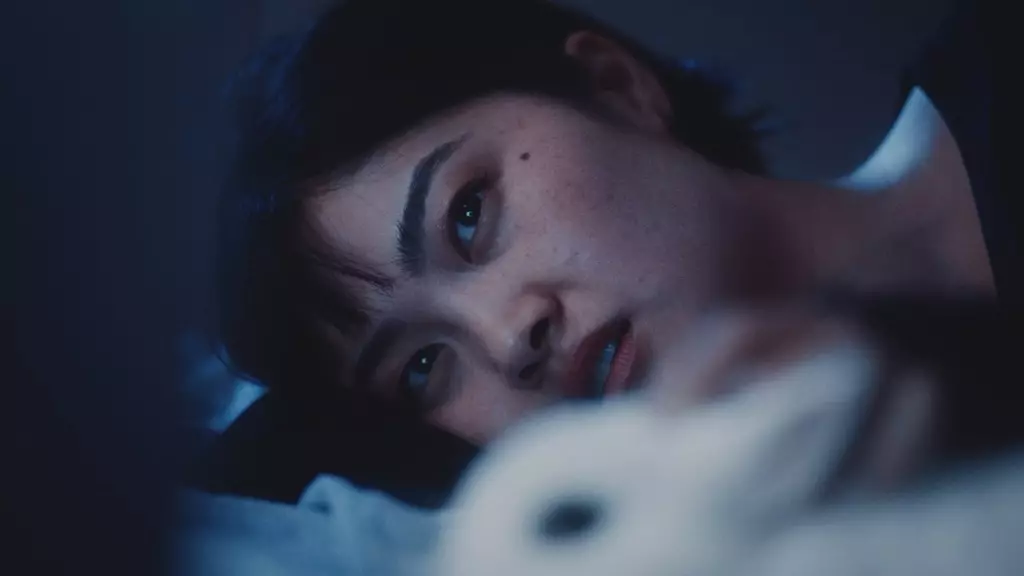Katarina Zhu’s feature debut, ‘Bunnylovr’, is not just a film; it’s a compelling exploration of the complex intersections of identity, intimacy, and the yearning for validation in an increasingly digital world. Central to this narrative is Becca, a Chinese American woman in her twenties, portrayed by Zhu herself, who grapples not only with her own existential dilemmas but also with toxic relationships that seem to define her existence. The film deftly navigates the themes of “daddy issues,” privilege, and self-love, all while presenting them through a lens that mixes humor with poignant introspection.
The story unfolds in the vibrant yet harsh backdrop of New York City, a choice that resonates with many young adults who find themselves wrestling with their dreams amid the chaos of urban life. Becca’s moonlighting as a cam girl introduces a layer of complexity to her character—a juxtaposition of empowerment and exploitation that speaks to larger societal issues. Her encounters with a persistent online client, who sends her a live bunny named Milk, serve as a catalyst for her journey toward self-acceptance and agency.
Becca’s interactions are emblematic of the swirling mess of contemporary relationships. From her estranged father William, skillfully portrayed by Perry Yung, to her artist friend Bella (Rachel Sennott), and the toxic presence of her ex-lover Carter (Jack Kilmer), Becca is perennially caught in the crossfire of expectation and exploitation. The narrative does a remarkable job of depicting how these relationships unfold, often leaving her feeling commodified rather than valued.
For instance, her father sees her as a lucky charm, relying on her for gambling tips, while Bella, despite her ostensible support, embodies a patronizing attitude masked as artistic admiration. These dynamics resonate with viewers, highlighting the often unrecognized burdens of being a people-pleaser in a world that values superficial connections. In this whirlwind, Becca’s relationship with John (Austin Amelio)—a cam client who offers financial reward in exchange for companionship—exposes the uncomfortable truth about power imbalances in modern interactions.
The Symbolism of the Bunny
Milk the bunny stands out as a central symbol throughout ‘Bunnylovr,’ representing Becca’s evolving sense of self and her journey towards reclaiming autonomy. Initially reluctant to accept the pet due to the complexities attached to her relationship with John, Becca’s eventual attachment to Milk marks a pivotal shift. Her nurturing of the bunny underscores her desire to find solace and care for both herself and those who depend on her. It’s through this nurturing that Becca begins to break free from the chains of expectation and objectification that have long dominated her life.
Furthermore, the film does not shy away from portraying the emotional resonance of Becca’s relationship with her father. As her story progresses, another furry friend appears, signifying a move towards reconciliation not just with her past but also with her own identity. This nuance adds depth to the portrayal of familial relationships, often strained yet vital.
By the film’s conclusion, Becca emerges not as a victim of her circumstances but as a character who has learned to advocate for herself. The journey she undertakes—from a drifting people-pleaser to a mindful individual capable of embracing joy and leaving behind toxic relationships—is universally relatable and empowering.
Zhu’s writing and direction distill these complex themes into an accessible narrative, making ‘Bunnylovr’ a significant film for anyone navigating the murky waters of intimacy in the digital era. The emotional high points are sharp and resonate deeply, reminding viewers of the beauty and pain inherent in human connection. With a talented supporting cast, striking visuals, and a heartfelt storyline, Zhu invites audiences on a cathartic journey that ultimately celebrates self-love and the poignant recognition of one’s worth.
Producers Tristan Scott-Behrends, Ani Schroeter, Rhianon Jones, Roger Mancusi, and Rachel Sennott have come together to amplify Zhu’s vision, creating a film that not only entertains but also offers a reflective look at the current state of interpersonal relationships in the age of technology. ‘Bunnylovr’ is a cinematic experience that lingers in the mind long after the credits roll, urging viewers to confront their own emotional landscapes in a search for connection and love.


Leave a Reply